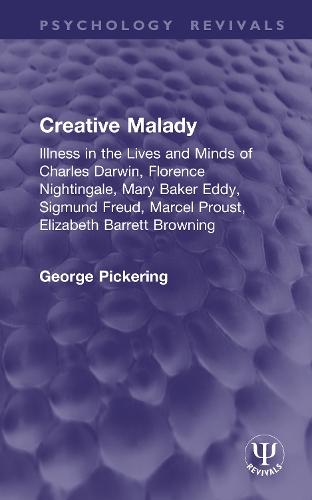Overview
In this highly provocative book, originally published in 1974, Sir George Pickering, former Professor of Medicine in the University of London and Regius Professor in the University of Oxford, examines the role of illness in the minds and lives of Charles Darwin, Florence Nightingale, Freud, Proust, Elizabeth Barrett Browning and Mary Baker Eddy. At the age of twenty-six Darwin returned from the voyage of the Beagle a vigorous young naturalist. Within two years he became a recluse and so remained until he died. Florence Nightingale came back from the Crimea at the age of thirty-six a national heroine. Within a year she was an invalid, within two bedridden. Yet she lived to ninety. Both used illness as a social ‘weapon’: Darwin, so that he could give his undivided attention to the theory of evolution; Florence Nightingale to bludgeon reluctant officials and to keep unwanted relatives at bay. With Mary Baker Eddy, Freud, and Proust psychological illness played a totally different role. Christian Science, psychoanalysis and À la recherche du temps perdu each owed its very existence to its creator’s attempted or successful self-cure – while with Elizabeth Barrett Browning, who at first sight seems a similar psychological creator, illness and creativity turn out to have no link. Creative Malady is a masterpiece of biographical detective work. For the first time the relationship between illness and creativity was explored. Each of the eminent Victorians described was possessed by a dominating passion and in each case the author shows what happened when that passion was thwarted or fulfilled. Today it can be read in its historical context. This book is a re-issue originally published in 1974. The language used and views portrayed are a reflection of its era and no offence is meant by the Publishers to any reader by this re-publication.
Full Product Details
Author: George Pickering
Publisher: Taylor & Francis Ltd
Imprint: Routledge
Weight: 0.790kg
ISBN: 9781041083726
ISBN 10: 1041083726
Pages: 338
Publication Date: 01 September 2025
Audience:
General/trade
,
College/higher education
,
Adult education
,
General
,
Tertiary & Higher Education
Format: Hardback
Publisher's Status: Active
Availability: Not yet available

This item is yet to be released. You can pre-order this item and we will dispatch it to you upon its release.
Author Information
Sir George Pickering (1904–1980) was, at the time of original publication, Master of Pembroke College, Oxford, and was a Professor of Medicine for thirty years, seventeen in the University of London, at St Mary’s Hospital, and thirteen as Regius Professor of Medicine at Oxford. He was Pro-Vice-Chancellor of Oxford University in 1967 and 1968, had served on the University Grants Committee, the Medical Research Council and the Council for Scientific Policy, was an Honorary Fellow of Pembroke College, Cambridge, a Fellow of the Royal Society and of the Royal College of Physicians, and held numerous honorary degrees from British and foreign universities. He was born in Northumberland. His wife was also a doctor as were three of their four children.



